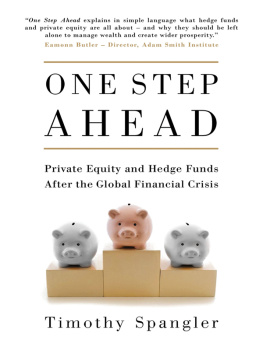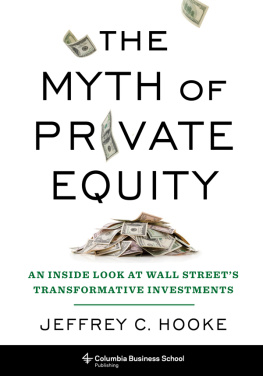Table of Contents
For Idit
Preface
I wrote this book for two reasons. First, readers of my New York Times DealBook column often ask me if there is a book explaining the mechanics of the deal and takeover markets. Prior to this time, there was nothing that quite fit. I hope this book fills this gap and provides even the most inexperienced reader and student an inside look into the intricacies, legal and otherwise, of deals and deal-making.
Second, recent catastrophic events in our capital markets have left many baffled, unable to understand what occurred and what it means for the future. This book is an attempt to order and make sense of the events leading up to and through the financial crisis. Gods at War is therefore the story of deal-making in the sixth takeover wave and through this crisis. It is about the private equity boom and its implosion, the return of the strategic transaction and hostile takeover, the failure of the investment banking model, the governments deal-making during the financial crisis, and the changes occurring in the capital markets during this time.
This book is ordered chronologically. I begin in Chapter 1 with a brief history of takeovers and a discussion of the key elements driving deals in todays capital markets. In Chapter 2, I trace the origins of private equity through a history of its creator, Kohlberg Kravis & Roberts Co. This detour is necessary because private equity is a key force driving the changes in todays deal market.
In Chapters 3 and 4, I move to fall 2007 and spring 2008. In these two chapters, I discuss the multiple implosions of private equity and other transactions and what it means for the future of deal-making, as well as private equity itself. I do so by first discussing in Chapter 3 the initial material adverse change disputes in the fall of 2007 and the key battles during this time, particularly that of Accredited Home Lenders, the mortgage originator, versus Lone Star Funds, the private equity firm. In Chapter 4, I discuss the second wave of deal disputes, which began in November 2007 with Cerberuss successful attempt to terminate its acquisition of United Rentals, the equipment rental company.This second wave of disputes would be driven by private equitys repeated attempts to terminate deals agreed to prior to the financial crisis and would be shaped by the material adverse change disputes earlier in the fall.
In Chapter 5, I discuss the sovereign wealth fund phenomenon. I use Temasek Holdings investment in Merrill Lynch as a launching board to discuss the nature of these investments during the initial phase of the financial crisis. Sovereign wealth funds may have had a brief heyday, but these investments tell us much about the regulation and importance of foreign capital. In Chapter 6, I move to the next phase of the book, discussing the fall of Bear Stearns. Much has already been written on this event, but my focus is new. In this chapter, I principally examine the innovative deal structures created and the deals significance for later deal-making and government action.
In Chapters 7, 8, and 9, I turn to the time after Bear Stearnss fall. In Chapter 7, I discuss the rise of the hedge fund activist investor and its potential for transforming change in the deal market. I do so by detailing two significant shareholder activist battles in the spring of 2008: Jana Partners targeting of CNET Networks, Inc., the Internet media company, and Childrens Investment Funds and 3G Capital Partners targeting of CSX Corp., the railroad operator.
In Chapter 8, I discuss the increasing role of hostile takeovers in deal-making through the lens of Microsoft Co.s hostile bid for Yahoo! Inc. and InBev NV/SAs hostile bid for the Anheuser-Busch Companies Inc. I connect the rise in shareholder activism detailed in Chapter 7 with the increased rate of hostile activity in recent years.
Chapter 9 discusses the changing nature of strategic transactions through and beyond the financial crisis. I examine the innovation that has recently occurred in the strategic deal market, in particular the deal structures used in the acquisitions of Wm. Wrigley Jr. Co. by Mars Inc. and Wyeth by Pfizer Inc. Both transactions borrowed heavily from the private equity model and were engineered to address the issues raised by the serial implosion of private equity deals in 2007 and 2008, discussed in earlier chapters.
I conclude with Chapters 10, 11, and 12. Chapter 10 discusses the government as dealmaker in the serial bailouts of AIG, Bank of America, Citigroup, and others and the implications of government by deal for our economy and for deal-making specifically.The last two chapters look to the future. In Chapter 11, I discuss potential reform of the nations takeover law. In the final chapter, Chapter 12, I draw on the conclusions of the prior 11 chapters to sketch the future of deal-making in a crisis age and beyond. In this final chapter, I also discuss whether deals and deal-making add value to our economy and examine the related question of the role of deals and deal-making in precipitating the global financial crisis.
We live in a time where many corporate veterans wonder whether a long 50-year cycle of deal-making that began with the go-go 1960s has come to an end, an end driven by a massive deleveraging of the financial system. But I am more hopeful believing that deals and deal-making will continue to be an integral, substantial, and necessary part of our capital markets. Either way, the events covered in this book are likely to set the course for deals and deal-making for the foreseeable future.
Ultimately, Gods at War is about the factors that drive and sustain deal-making. It is a legal-oriented history of the recent events that will alter and strongly influence the future of deal-making. It is also the story of the deal machine, the organizations built up to foster deal-making as well as the increasingly important role of shareholders themselves. In the midst of these forces sit the corporate executives and their advisers who decide whether to deal or not. Their own individual personalities and ego-driven decisions further shape and drive deal-making. It is here where I draw the title for this book. These individuals, like gods, can determine the future of companies and our economy.
Authors Note
Portions of this book cover topics first written about in the New York Times DealBook and the M&A Law Prof Blog. In addition, parts of this book were taken or based on my following prior writings: Regulation by Deal: The Governments Response to the Financial Crisis Administrative Law Review (forthcoming) (with David Zaring); The Failure of Private Equity, 82 Southern California Law Review 481 (2009); Black Market Capital, 2008 Columbia Business Law Review 172; The SEC and the Failure of Federal Takeover Regulation, 34 Florida State University Law Review 211 (2007); and Accredited Home Lenders v. Lone Star Funds: A MAC Case Study (February 11, 2008) (with Kristen Baiardi).
Prologue
The social caste of NewYork is still set by money and the power to control it. Money provides an entre into New York society, but the power quotientyour position in the financial industryranks you among your peers. It was thus no coincidence that the New York social event of 2007 was the 60th birthday party of Stephen Schwarzman, chief executive officer (CEO) and co-founder of the private equity firm the Blackstone Group.









